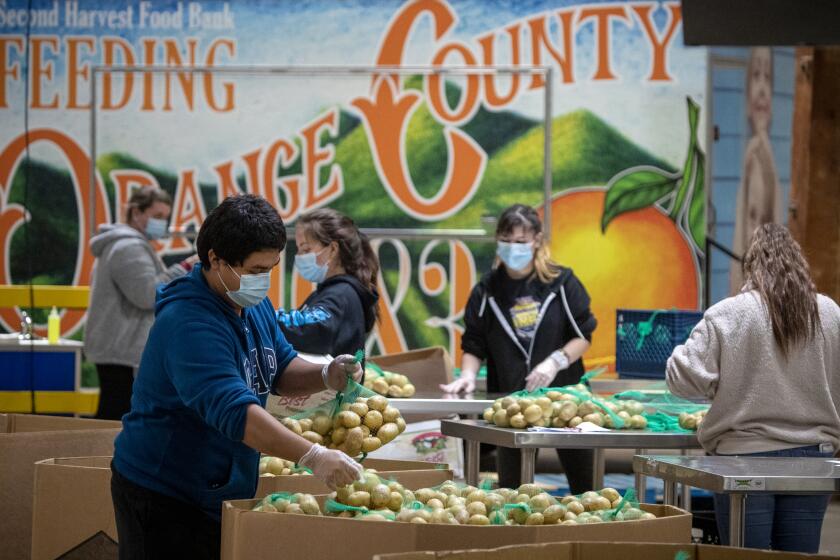Orange County starts to release racial data for coronavirus patients
Limited racial data released by the Orange County Health Care Agency shows a disproportionate mortal impact among patients of Asian descent who contract COVID-19.
The expanded demographic data for infections and deaths, which the county started posting Thursday, are incomplete — about half of confirmed cases are in people of unknown race or ethnicity. Similarly, race is unknown in five of the 17 total deaths attributed to the respiratory disease.
But what is known paints a troubling picture for Asian patients: at least six of the deaths were Asians, representing at least 35% of deaths overall and 50% where race or ethnicity was known. For overall confirmed COVID-19 infections, Asians represented 77 of the 521 cases, or about 15%, where race or ethnicity was known.
Among other cases with known races and ethnicities, whites were 44% of infections, Latinos 24%, blacks 2% and other races combined for the remaining 15%. Race was unknown for 52% of patients.
Among deaths, in addition to the five of unknown race and six of Asian descent, three were Latino, two were white and one was classified as “other.”
Orange County’s population is about 40% white, 34% Latino, 21% Asian, 2% black and 3% multiracial and other categories, according to census data.
Dr. Nichole Quick of the Orange County Health Care Agency did not offer any reasons why the data skews this way but did say that it was incomplete and would improve.
“As we get more of this information, we will update that and get sort of a better picture of what this looks like,” she said at a Thursday news conference. “Once again we have a significant amount of this demographic data missing from both our cases and our deaths.”
Overall, known cases of COVID-19 increased to 1,079 Thursday, with no new deaths. The current cumulative case count comes from 12,239 tests.
The day-to-day case count is up by 67 over Wednesday. Daily county data is preliminary and subject to change.
The agency also said Thursday that 127 people were hospitalized with the virus, 63 of them in intensive care. The figure comes from 24 area hospitals.
Here are the latest case counts for select cities, with their numbers per 10,000 residents:
- Anaheim: 114 (3.2 cases per 10,000 residents)
- Irvine: 90 (3.2 cases per 10,000 residents)
- Newport Beach: 81 (9.3 cases per 10,000 residents)
- Huntington Beach: 76 (3.7 cases per 10,000 residents)
- Santa Ana: 78 (2.3 cases per 10,000 residents)
- Laguna Beach: 35 (15 cases per 10,000 residents)
- Costa Mesa: 21 (1.8 cases per 10,000 residents)
- Fountain Valley: 16 (2.8 cases per 10,000 residents)
Also on Thursday, Quick recommended that people wear face coverings when out doing essential activities. She said she “recommends strongly” that people wear professionally manufactured or improvised covers over their noses and mouths but did not mandate them as other counties have.
Health officials on Thursday strongly encouraged employees at businesses open during the pandemic to wear face coverings while at work.
“I want to be clear about what these face coverings are and are not. The face coverings we are referring to in the guidance relate to a cloth face covering that ... can be made at home or purchased,” Quick said. “What these face coverings are not are the N95 respirators and surgical masks, which our first responders and healthcare providers need and which we all know are under critical shortage right now.”
Quick said the coverings are to slow the spread of respiratory particles by people who could be asymptomatic carriers of COVID-19, but are not to replace regular hand-washing, covering coughs and sneezes, and generally staying home and practicing physical distancing.
She said she could upgrade to a mask mandate in the future but for now it’s not necessary, as trends give her hope that Orange County is flattening its curve, or preventing a sharp peak that could overwhelm hospitals. While acknowledging that the area has seen limited testing, a nationwide problem, Quick said available data show the doubling rate is stretching out.
From March 13-28 confirmed cases doubled on average once every three days. They did not double again until seven days later on April 4, when they reached 786 cases — and though cases have continued to steadily climb, they have not yet doubled since.
Updated figures are posted daily at occovid19.ochealthinfo.com/coronavirus-in-oc.
All the latest on Orange County from Orange County.
Get our free TimesOC newsletter.
You may occasionally receive promotional content from the Daily Pilot.





